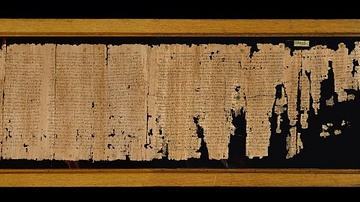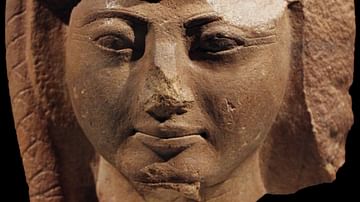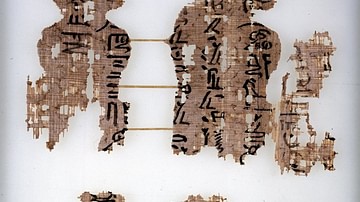Setna I (also Setna Khaemaus and the Mummies) is a work of ancient Egyptian literature from the Ptolemaic Period (323-30 BCE) written in demotic script. It is part of a cycle of stories known as the Tales of Prince Setna featuring a character based on Khaemweset (c. 1281 - c. 1225 BCE), the fourth son of Ramesses II (1279-1213 BCE).
Khaemweset is known as the 'First Egyptologist' for his devotion to recording and preserving the monuments and temples of Egypt's past during the era known as the New Kingdom (c. 1570-1069 BCE).
Khaemweset was well known in the Ptolemaic Period as a prince, a sage, and magician, who had preserved the past and often entered other people's tombs in this endeavor. The fictional character of Setna Khamwas is modeled on these aspects of his life in that Setna, too, is a princely sage and magician who possesses magical amulets and charms and knows how to use them; and who goes into others' tombs uninvited.
The beginning of Setna I is missing but has been reconstructed from contextual clues in the extant manuscript (Papyrus No. 30646 of the Cairo Museum) and from fragments elsewhere. Scholar Miriam Lichtheim, and others following, divide the story into four chapters: Setna and Naneferkaptah; Setna Takes the Book; Setna and Taboubu; Setna Returns the Book. The following is a detailed summary of the story.
Setna & Naneferkaptah
The story begins as Setna and his foster brother Inaros are searching the necropolis of Memphis for an old tomb. He has been told that a magical book rests in this tomb of the long-dead prince and magician Naneferkaptah (Na-nefer-ka-ptah). When he enters the tomb, he sees the book radiating light and moves to take it but is stopped by the ghosts of Naneferkaptah, his wife Ahwere, and their son Merib. Ahwere tells Setna he cannot take the book because all three of them lost their lives because of it. There is no indication that Setna cares but Ahwere launches into the story of the book and the family's tragedy.
She tells him how she and Naneferkaptah were brother and sister and loved each other but were betrothed by the king, their father, to other people. Ahwere managed to change their father's mind, however, and the two were married. Shortly afterwards, she gave birth to Merib. Naneferkaptah was a scribe and scholar whose great interest was in reading ancient inscriptions. One day he meets a priest who tells him of a magic book of Thoth, written in the god's own hand, which is hidden - protected by serpents and scorpions - in a box at the bottom of the sea. For a sizeable fee, the priest will tell Naneferkaptah how to find it and an agreement is made.
Naneferkaptah tells his father about the book and is given a ship and supplies for the expedition. Ahwere and Merib accompany him and they sail from Memphis to Coptos where they are received and entertained with honor by the priests and royalty. Ahwere tries to talk Naneferkaptah out of continuing on to find the book, since they are so happy in their lives together, but he refuses. He creates a crew out of wax figures and brings them to life through magical spells, not wanting to endanger anyone else on the mission, and then sets off for the place in the sea where the book is supposed to be.
After three days his magical crew brings him to the spot where he casts sand upon the waters and divides them. He looks down to see the six miles of serpents, scorpions, and reptiles which guard the book and the one great eternal serpent which was coiled around the box. He recites a spell to hold the six miles of serpents, scorpions, and reptiles at bay and then attacks the eternal serpent. He kills it twice, and both times it comes back to life. The third time he cuts it in half and throws sand into the wounds, and the creature dies. He opens the box of iron and finds a box of copper inside, opens that and finds a box of juniper wood, opens that and finds a box of ivory and ebony, then a box of silver and then one of gold; inside the box of gold is the magic book.
Naneferkaptah tries the spells the priest had told him he could command:
He recited a spell from it: he charmed the sky, the earth, the netherworld, the mountains, the waters. He discovered what all the birds of the sky and the fish of the deep and the beasts of the desert were saying. He recited another spell: he saw Pre [the sun god Ra] appearing in the sky with his Ennead and the Moon rising, and the stars in their forms. He saw the fish of the deep, though there were twenty-one divine cubits of water over them. (Lichtheim, 130)
Everything has gone precisely as the priest assured him it would and he returns to the boat and commands his crew to row him back to Coptos.
While he has been away, Ahwere has been sitting by the dock hoping for his return, neither eating nor drinking. She is overjoyed when she sees him, and he invites her to try the spells. Ahwere is amazed by the power of the book and what she can do. Naneferkaptah copies the book, soaks the copy in water, and when it has dissolved, drinks it and so internalizes the book's power. The couple return to the palace at Coptos to celebrate and plan their return to Memphis.
At this same time, however, Thoth has discovered the theft and complains to Ra how Naneferkaptah has stolen his book and killed his guardian. Ra tells him he may seek justice in ensuring that Naneferkaptah never reaches Memphis with the book and they cast a divine spell from the heavens to this effect. As Naneferkaptah and his family are sailing home, his son Merib falls overboard and drowns. They return to Coptos for the funeral and then start out again, but this time Ahwere falls overboard - at the same place where Merib died - and also drowns. The ship again returns to Coptos for the second funeral.
After he has buried his wife and son, Naneferkaptah sets out again for Memphis with the book but is overcome with grief. He says, "If I go to Memphis now and Pharaoh asks me about his children, what shall I say to him? Can I say to him, 'I took your children to the region of Thebes; I killed them and stayed alive and I have come to Memphis yet alive'?" (Lichtheim, 132). He then straps the book to his body, leaps overboard at the same spot where the others died, and drowns. When the ship reaches Memphis, his body is discovered caught on the rudder and the pharaoh orders that he be buried with the book so that it will cause no one any more trouble.
Setna Takes the Book
The ghost of Ahwere finishes her story at this point and tells Setna he cannot have the book for obvious reasons: all three of them died because of it, and he has no legitimate claim to it. Setna does not care and tells her she can allow him to have it or he can take it by force. The ghost of Naneferkaptah then speaks asking how it could be possible that Setna would claim something that he has no right to. He challenges the prince to a game of draughts.
They play three games, and Setna loses each time. When he loses the first game, Naneferkaptah strikes him over the head with the game board, and his legs sink into the ground. After the second game, Setna is again struck on the head and sinks up to his groin. When he loses the third game he is struck again and is pushed into the ground up to his ears. At this point, he calls to Inaros for help who brings his magic amulets and puts them on him. Setna is instantly freed from the earth, springs up, snatches the book, and runs from the tomb.
Ahwere cries that all is lost because the book they gave their lives for has been taken and they are left with nothing. Naneferkaptah consoles his wife and tells her not to worry; he will force Setna to return the book. Setna has no intention of doing anything like this and goes home to show the book to his father, the pharaoh. Pharaoh tells him to bring the book back to the tomb and its rightful owners. Setna ignores this advice, however, and spends his time reading from the book to anyone who will listen.
Setna & Taboubu
Setna is next seen on the streets of Memphis, taking a walk when he notices an exceptionally beautiful woman. He has never seen anyone like her before and instantly lusts after her, sending one of his servants to ask who she is. Even when he is told that she is Taboubu, a noblewoman, daughter of a priest of Bastet, this makes no difference to him; he sends the servant back to ask her to spend an hour with him in return for ten pieces of gold. She, instead, invites him to come visit her at her home in Bubastis, the city sacred to the worship of Bastet. He agrees and hurries to a boat to take him there as quickly as he can.
When Setna reaches Bubastis, Taboubu invites him into her home and offers him something to eat, but he is too consumed with desire for her and refuses. He tells her they should get to what they have come together for, but she stops him and gives one stipulation after another. First, she has him sign over to her all his lands and worldly possessions, which he does; then she has his children brought to witness this transfer and make it legal; he agrees to this also and has them sign; finally she demands that his children be killed so that they will not later contest the transfer; Setna also agrees to this, has them killed, and sits admiring Taboubu in a sheer gown while the dogs eat his children's bodies in the street.
Setna is now more impatient than ever and moves to take Taboubu. At this moment, though, she screams, vanishes, and he finds himself naked in the street with his penis thrust into a clay pot. He is standing there confused when his father and a royal entourage come down the avenue. Pharaoh stops and asks what is wrong with him, and Setna answers that it is Naneferkaptah who is behind all the trouble. Pharaoh tells him that everything he has experienced was just a dream and he should return home to Memphis where he will find his children and his lands safe and intact. He has a servant give Setna some clothes and the prince leaves for home.
Setna Returns the Book
Back in Memphis, the pharaoh tells Setna again to return the book before something far worse happens to him. This time Setna listens to his father and goes back to the tomb in the precise way Naneferkaptah wanted him to. He is greeted by Ahwere and Naneferkaptah as though they expected him, and after giving them back the book, he asks if there is anything he can do to make restitution. Naneferkaptah explains how, when his wife and son died, they were buried in Coptos near Thebes while, when he died, the boat dragged him back to Memphis and so he came to be buried there. The mummies of his wife and son remain in Coptos, and he would like them all to be together in his tomb. Setna instantly agrees to this and leaves to prepare a ship.
He sails to Coptos where he is entertained by the priests of Isis and Harpocrates in the same lavish way that Ahwere described in her story earlier. He then tells them his mission, and they help him search for three days and three nights through the desert necropolis for the old tombs but cannot find them. Meanwhile, back in his tomb in Memphis, Naneferkaptah sees the trouble they are having and sails there as a spirit, incarnating as an aged priest.
Naneferkaptah-as-priest positions himself where Setna will pass, and when he does, the prince stops and asks if he has any idea where Ahwere and Merib might have been buried in the distant past. The priest answers that their grave is now beneath the south corner of the house of the chief of police in town. Setna doubts this and suggests that perhaps the old man holds a grudge against the police chief and would simply like to see his house destroyed for no reason. The priest replies that he will happily be placed under guard, and if they do not find the tomb where he claimed, he will submit to punishment.
Setna and the priests destroy the police chief's house and, beneath it, find the tomb just where the aged priest said it would be. They remove the mummies, and then Setna pays for the house to be repaired and restored. The aged priest then reveals himself as Naneferkaptah and tells Setna the disguise was necessary or he would never have found the tomb. Setna returns to Memphis with the two mummies and has them interred in the tomb with the book. The family is now reunited, the book of Thoth safely again out of human reach, and Setna goes on with his life, having learned an important lesson in not presuming to take what does not belong to him.
Commentary
The most often cited section of the work is Setna and Taboubu which has remained a popular story since it was first written and has been adapted by a number of authors since in their own work. It is not surprising that this section seems so favored since it develops the theme of the entire piece. Egyptologist Geraldine Pinch suggests that Taboubu is the goddess Bastet in human form who punishes Setna for his presumption that a woman is only a sex object. While this interpretation is valid, it is only one aspect of the chapter and the entire work. The Setna and Taboubu section illustrates what happens when one wants something so badly that one forgets one's duty to self, family, and community; this would have been understood by an ancient Egyptian audience as forgetting ma'at, the divine principle of harmony and balance.
In every translation of the story, when Setna first sees Taboubu on the street of Memphis, the narrative states he "did not know where on earth he was" and can only think of possessing her. Throughout the rest of the chapter, he willingly sacrifices his family and everything he owns just to satisfy his lust with Taboubu. He has forgotten about the core value of his culture, ma'at, which allowed the universe to function. Setna has, in fact, lost his balance.
Losing one's balance is the theme of the entire piece, however. The value of ma'at is forgotten by each of the main characters at crucial moments. Ahwere and Naneferkaptah lose their balance, and then their lives and that of their son, in pursuit of the magic book. Setna loses his when he enters the tomb and steals the book, and this is made clear in his encounter with Taboubu. In order to regain this balance, the value of ma'at must again be observed by returning what was stolen and making restitution. Once this has been accomplished, as in any good story, everyone lives happily ever after; whether in this life or the next.








